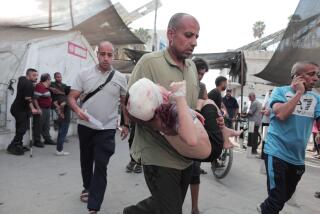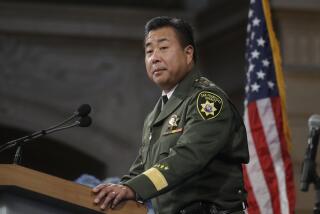S. Africa Police Camp Attacked; 1 Dead, 64 Hurt
- Share via
CAPE TOWN, South Africa — A black police trainee was killed and 64 others were injured Tuesday morning near Johannesburg when a hand grenade was thrown onto the parade ground of a police college where they were marching.
The grenade, thrown over a tall security fence from a passing pickup truck, exploded amid two platoons, each of 36 men, at a training center for black municipal police from throughout the country in Soweto, the black satellite city outside Johannesburg.
Six of the men were seriously injured, according to the government’s Bureau for Information in Pretoria. Neither the trainees nor their instructors were armed at the time, the bureau said.
It is at this facility that the authorities have trained many of the black policemen who for the last year have been evicting people engaged in a rent strike.
2nd Bombing Downtown
Later Tuesday, a bomb exploded beneath a parked car near downtown Johannesburg, causing extensive damage but no injuries, according to police.
“There was a terrible bang, and then there was smoke and flames and the sound of breaking glass,” a witness said.
The blast, across from a railway station, may have been connected to a prolonged strike by 22,000 black workers against the state-run rail system. The strikers have been given until this morning to return to their jobs or face dismissal. Arsonists attacked at least 20 trains last week, burning more than 60 cars and causing damage estimated at $12.5 million.
On Tuesday afternoon, policemen surrounded the offices of the Congress of South African Trade Unions, the labor federation to which the strikers’ union belongs, and searched everyone leaving. The Bureau for Information said this was a “precautionary measure in the light of recent violence.”
Heavily armed contingents of riot police and combat troops were deployed at most railway stations and depots around Johannesburg this week after the arson attacks.
The train attacks in South Africa’s industrial center were seen as an expression of black anger at the deadlock in the six-week-old strike, which has turned into a major test of strength between the government and the 700,000-member Congress of South African Trade Unions and its affiliate, the South African Railway and Harbor Workers Union.
In further violence Tuesday, policemen clashed with mourners at a funeral in Soweto for two brothers believed to be members of the outlawed African National Congress. The brothers were killed earlier this month in a gun battle with police outside Ventersdorp in western Transvaal province. A white policeman was also killed in that incident.
Witnesses said that police used whips to disperse the mourners after the funeral and that several women, including the dead men’s mother, were injured.
The attack on the police training center was one of the most daring in recent months against the South African security forces. It came after government warnings that the African National Congress, the principal guerrilla group fighting continued white minority rule here, planned an all-out terrorist campaign to disrupt the whites-only parliamentary election scheduled for May 6.
‘Revolutionary Strategy’
The government-owned South African Transport Services said Tuesday that the railway strike, the largest and longest in the country’s public sector, was part of the “revolutionary strategy” aimed at overthrowing the white-led minority government, and it linked the unions to the African National Congress and the alleged terrorist campaign to disrupt the elections.
Anonymous callers, however, told news organizations in Johannesburg that the Azanian People’s Liberation Army, the military wing of the outlawed Pan Africanist Congress, was responsible for the grenade attack on the police training center.
The Pan Africanist Congress broke from the African National Congress nearly 30 years ago to follow more radical policies, and it has been trying to raise its profile in recent months through increased political, diplomatic and military activity.
Commandant Pieter de Beer, commander of the police training center, who described the attack as “horrifying,” said he was certain that it would only stiffen the resolve of the black policemen to return to their communities and fight the radicals.
The municipal police, who perform many security duties in black townships in addition to enforcing local ordinances, have been one of the main targets of black militants in nearly three years of political violence. Many black policemen were forced to live in compounds on the outskirts of townships after their homes were attacked. More than 60 policemen, most of them black, have been killed in the continuing violence here.
Censorship rules imposed under South Africa’s 10-month-old state of emergency prohibit or restrict reporting about the country’s civil unrest, security force actions, the treatment of political detainees, most forms of peaceful protest and statements the government considers to be subversive.
More to Read
Sign up for Essential California
The most important California stories and recommendations in your inbox every morning.
You may occasionally receive promotional content from the Los Angeles Times.













